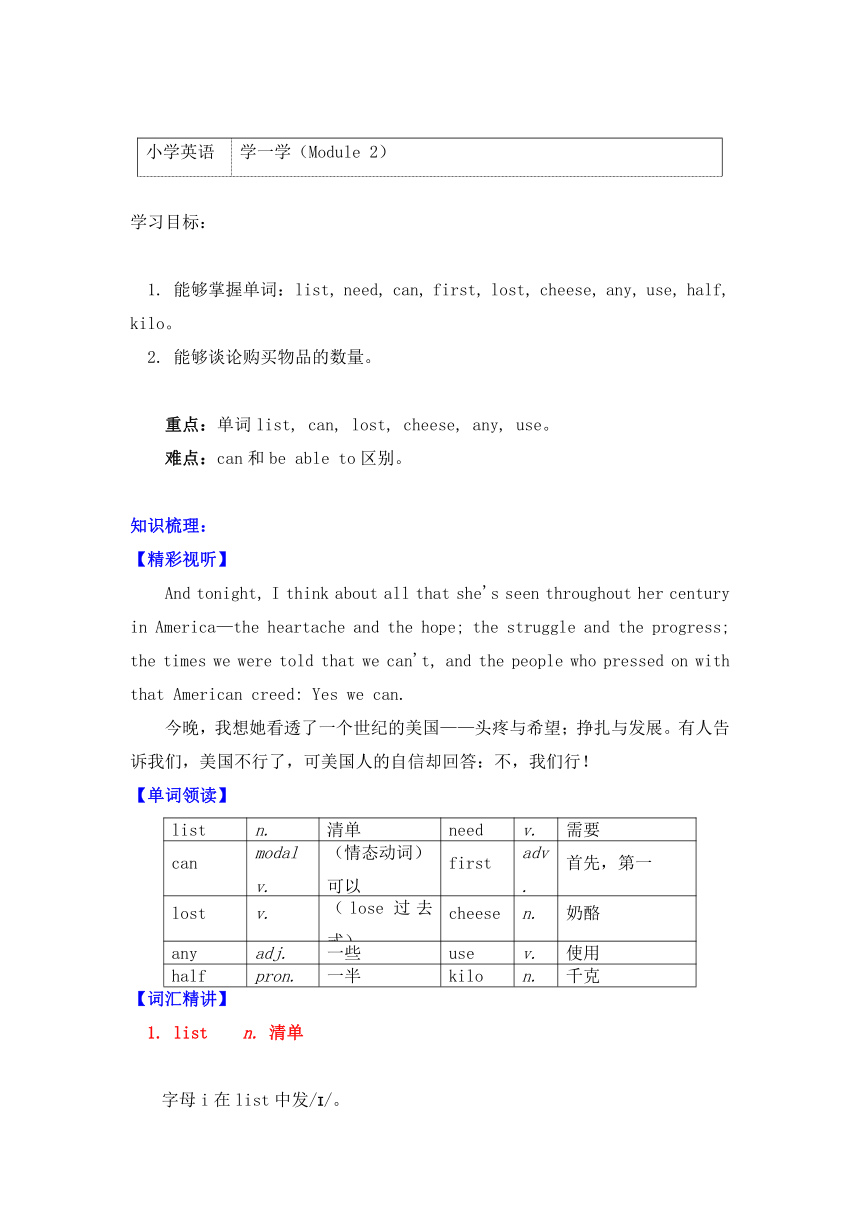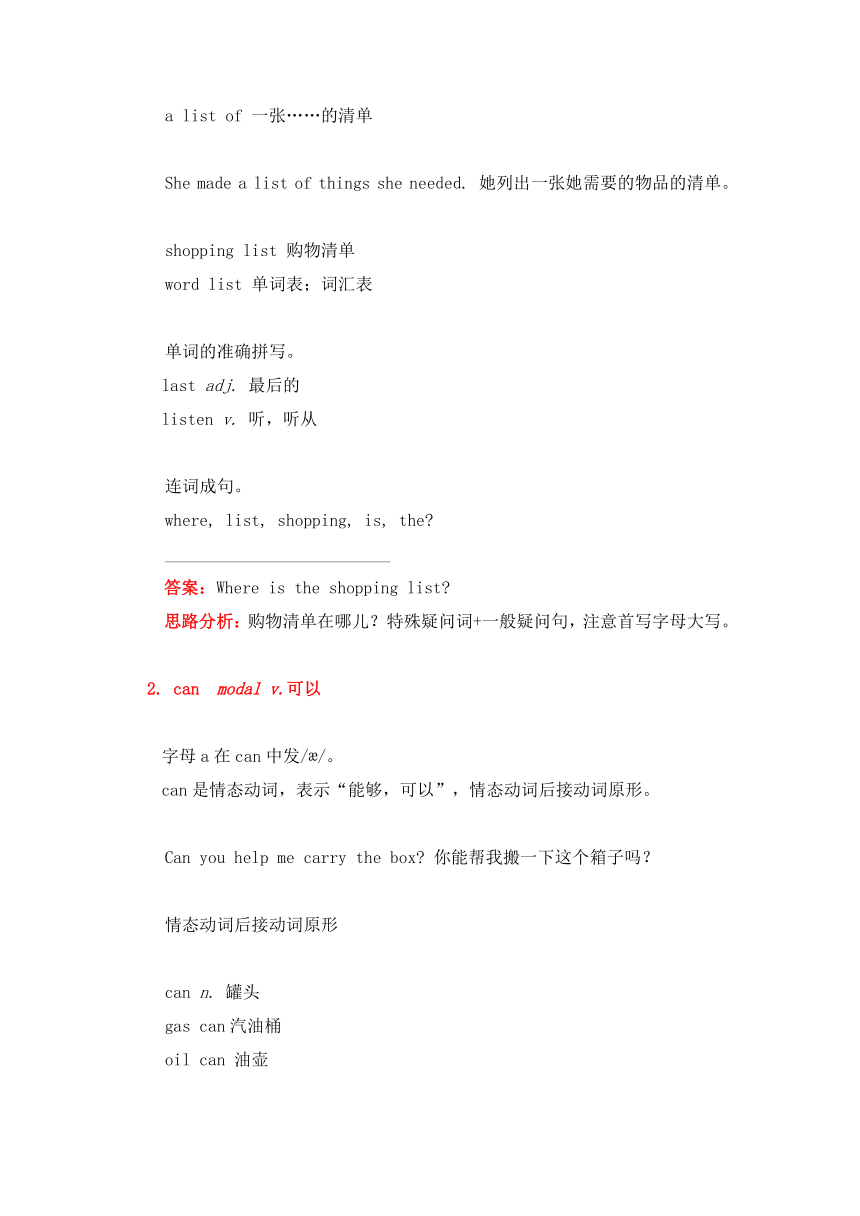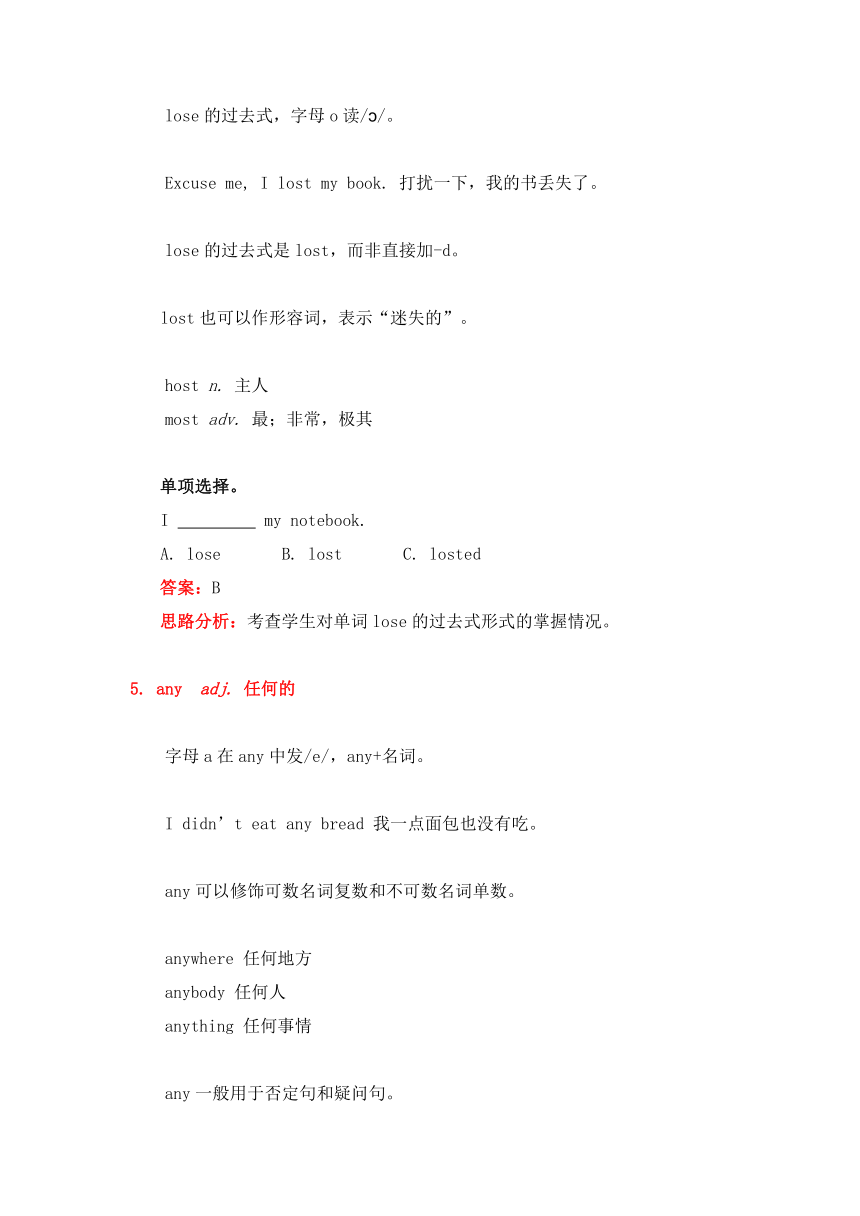外研版(三起)英语五年级上册 学一学(Module 2)-导学案
文档属性
| 名称 | 外研版(三起)英语五年级上册 学一学(Module 2)-导学案 |  | |
| 格式 | doc | ||
| 文件大小 | 75.0KB | ||
| 资源类型 | 教案 | ||
| 版本资源 | 外研版(三年级起点) | ||
| 科目 | 英语 | ||
| 更新时间 | 2020-08-28 08:19:41 | ||
图片预览




文档简介
小学英语 学一学(Module 2)
学习目标:
1. 能够掌握单词:list, need, can, first, lost, cheese, any, use, half, kilo。
2. 能够谈论购买物品的数量。
重点:单词list, can, lost, cheese, any, use。
难点:can和be able to区别。
知识梳理:
【精彩视听】
And tonight, I think about all that she's seen throughout her century in America—the heartache and the hope; the struggle and the progress; the times we were told that we can't, and the people who pressed on with that American creed: Yes we can.
今晚,我想她看透了一个世纪的美国——头疼与希望;挣扎与发展。有人告诉我们,美国不行了,可美国人的自信却回答:不,我们行!
【单词领读】
list n. 清单 need v.
.. 需要
can modal v. (情态动词)
可以 first adv. 首先,第一
lost v. (lose过去式)
丢失 cheese n. 奶酪
any adj. 一些 use v. 使用
half pron. 一半 kilo n. 千克
【词汇精讲】
1. list n. 清单
字母i在list中发/?/。
a list of 一张……的清单
She made a list of things she needed. 她列出一张她需要的物品的清单。
shopping list 购物清单
word list 单词表;词汇表
单词的准确拼写。
last adj. 最后的
listen v. 听,听从
连词成句。
where, list, shopping, is, the?
__________________________
答案:Where is the shopping list?
思路分析:购物清单在哪儿?特殊疑问词+一般疑问句,注意首写字母大写。
2. can modal v.可以
字母a在can中发/?/。
can是情态动词,表示“能够,可以”,情态动词后接动词原形。
Can you help me carry the box? 你能帮我搬一下这个箱子吗?
情态动词后接动词原形
can n. 罐头
_gas_can_汽油桶
oil can 油壶
be able to 表示经过后天学习,可以做……。
I am able to drive the car. 我可以开汽车。
can 表示天生的能力,不需要后天学习。
Fish can swim. 鱼儿天生会游泳。
We pick flowers in the park.
A. can’t B. must C. can
答案:A
思路分析:句意,我们不可以在花园里摘花。can’t表示不能,不被允许。
3. cheese n. 奶酪
不可数名词,字母组合ee在cheese中发/i?/。
Can you give me some cheese? 你可以给我一些奶酪吗?
_big_cheese_大人物,重要人物
_hard_cheese_恶运;倒霉,不幸
准确拼写cheese,其中为两个e。
cheek n. 面颊,脸颊
geek n.极客,即智力超群的人
(奶酪)doesn’t digest easily.
答案:Cheese
思路分析:奶酪不容易消化,cheese奶酪。
4. lost v. (lose的过去式) 丢失
lose的过去式,字母o读/?/。
Excuse me, I lost my book. 打扰一下,我的书丢失了。
lose的过去式是lost,而非直接加-d。
lost也可以作形容词,表示“迷失的”。
host n. 主人
most adv. 最;非常,极其
单项选择。
I my notebook.
A. lose B. lost C. losted
答案:B
思路分析:考查学生对单词lose的过去式形式的掌握情况。
5. any adj. 任何的
字母a在any中发/e/,any+名词。
I didn’t eat any bread 我一点面包也没有吃。
any可以修饰可数名词复数和不可数名词单数。
anywhere 任何地方
anybody 任何人
anything 任何事情
any一般用于否定句和疑问句。
some可以修饰可数名词复数和不可数名词,一般用于肯定句。
选词填空。
any some
1. I don’t have ________ milk.
2. There is ________ water in the glass.
答案:any some
思路分析:any用于否定句和疑问句中,some用于肯定句中,在疑问句中表示语气委婉。
6. use vt. 利用;耗费
字母u在use中发/ju?/,第三人称单数uses,动词ing形式using。
use up 用光
May I use your book? 我可以借你的书用一下吗?
use n. 用途
used adj. 习惯的
make good use of 充分利用……
in use 在使用中
use+ful=useful adj. 有用的
useful的后缀是ful。
适当形式填空。
1. Water is very (use).
2. Flowers in the park are (beauty).
答案:useful, beautiful
思路分析:1. 水资源非常有用,useful有用的。
2. 公园的花很漂亮。beautiful漂亮的。
即学即练:
单项选择。
( )1. Where ________ they go yesterday?
A. do B. did C. does
( )2. I didn’t buy ________ at all.
A. something B. nothing C. anything
( )3. I went to the park and ________ lots of places.
A. saw B. see C. sees
( )4. Did they meet John? _________.
A. Yes, they did. B. No, he didn’t. C. No, they did.
( )5. Then we went home ________ bus.
A. on B. in C. by
答案:B C A A C
思路分析:1. 句意,昨天他们去哪里了?过去时用did。
2. 句意,我之前没有买任何东西。anything用于否定句或疑问句。
3. 句意,我去公园了,同时也去很多地方看了看。see的过去式是saw。
4. 句意,之前他们见过约翰吗?肯定形式的表达为A选项。
5. 句意,我们坐公交车回的家。坐公交车by bus。
同步练习:
(答题时间:15分钟)
一、单项选择。
( )1. How are you ? _________.
A. I’m fine. B. Nice to meet you . C. Hello.
( )2. This is our _______ friend, Lingling.
A. China B. Chinese C. the USA
( )*3. You _______ back from China !
A. am B. is C. are
( )4. Do you live in this city ? ________.
A. Yes, I did. B. Yes, I do. C. No, I didn’t.
( )*5. _______ did you come back from London ?
A. When B. Where C. What
二、仿写句子。
例:she has an ice cream —— She had an ice cream.
1. They go home bus by. ________________________________________
**2. She drops her glasses. ________________________________________
*3. He comes home from Beijing.________________________________________
4. I run to the park.________________________________________
三、句型转换。
1. Jack went to the library yesterday.(对划线部分提问)
_______ did Jack ________ to the library ?
*2. Lisa had a hot dog yesterday. (对划线部分提问)
________did Lisa ____________ yesterday?
3. They go home.(变为现在进行时)
They ___________ ____________ home.
4. Mike comes from Shanghai.(用last week改为过去时)
Mike _____________ _____________ Shanghai last week.
四、补全短文。
home back when live came
A: Hello, John. How are you?
B: I’m fine, thank you. You are 1 from China!
A: Yes, we are 2 .
B: 3 did you come back ?
A: We 4 back last Sunday. This is our Chinese friend, Lingling.
B: Hello, Lingling.
C: Hi, John. Do you 5 in London?
B: Yes, I live near Amy and Sam.
答案:
一、
1. A 解析:你好吗?我很好。
2. B 解析:这是我们的中国朋友,玲玲。
3. C 解析:你从中国回来了!be back from,you对应are。
4. B 解析:你在这个城市居住吗?是的,我是。Yes, I do.
5. A 解析:你什么时候从伦敦回来的?when什么时候。
二、
1. They went home by bus.
2. She dropped her glasses.
3. He came home from Beijing.
4. I ran to the park.
解析:考查动词过去式。
三、
1. When go 解析:对时间提问用when。
2. What have 解析:对什么提问用what。
3. are going 解析:现在进行时,be+doing。
4. came from 解析:come的过去式came。
四、
1. back 解析:从中国回来,be back from。
2. home 解析:在家 be home。
3. When 解析:什么时候when。
4. came 解析:come过去式came。
5. live 解析:live in 在……居住。
学习目标:
1. 能够掌握单词:list, need, can, first, lost, cheese, any, use, half, kilo。
2. 能够谈论购买物品的数量。
重点:单词list, can, lost, cheese, any, use。
难点:can和be able to区别。
知识梳理:
【精彩视听】
And tonight, I think about all that she's seen throughout her century in America—the heartache and the hope; the struggle and the progress; the times we were told that we can't, and the people who pressed on with that American creed: Yes we can.
今晚,我想她看透了一个世纪的美国——头疼与希望;挣扎与发展。有人告诉我们,美国不行了,可美国人的自信却回答:不,我们行!
【单词领读】
list n. 清单 need v.
.. 需要
can modal v. (情态动词)
可以 first adv. 首先,第一
lost v. (lose过去式)
丢失 cheese n. 奶酪
any adj. 一些 use v. 使用
half pron. 一半 kilo n. 千克
【词汇精讲】
1. list n. 清单
字母i在list中发/?/。
a list of 一张……的清单
She made a list of things she needed. 她列出一张她需要的物品的清单。
shopping list 购物清单
word list 单词表;词汇表
单词的准确拼写。
last adj. 最后的
listen v. 听,听从
连词成句。
where, list, shopping, is, the?
__________________________
答案:Where is the shopping list?
思路分析:购物清单在哪儿?特殊疑问词+一般疑问句,注意首写字母大写。
2. can modal v.可以
字母a在can中发/?/。
can是情态动词,表示“能够,可以”,情态动词后接动词原形。
Can you help me carry the box? 你能帮我搬一下这个箱子吗?
情态动词后接动词原形
can n. 罐头
_gas_can_汽油桶
oil can 油壶
be able to 表示经过后天学习,可以做……。
I am able to drive the car. 我可以开汽车。
can 表示天生的能力,不需要后天学习。
Fish can swim. 鱼儿天生会游泳。
We pick flowers in the park.
A. can’t B. must C. can
答案:A
思路分析:句意,我们不可以在花园里摘花。can’t表示不能,不被允许。
3. cheese n. 奶酪
不可数名词,字母组合ee在cheese中发/i?/。
Can you give me some cheese? 你可以给我一些奶酪吗?
_big_cheese_大人物,重要人物
_hard_cheese_恶运;倒霉,不幸
准确拼写cheese,其中为两个e。
cheek n. 面颊,脸颊
geek n.极客,即智力超群的人
(奶酪)doesn’t digest easily.
答案:Cheese
思路分析:奶酪不容易消化,cheese奶酪。
4. lost v. (lose的过去式) 丢失
lose的过去式,字母o读/?/。
Excuse me, I lost my book. 打扰一下,我的书丢失了。
lose的过去式是lost,而非直接加-d。
lost也可以作形容词,表示“迷失的”。
host n. 主人
most adv. 最;非常,极其
单项选择。
I my notebook.
A. lose B. lost C. losted
答案:B
思路分析:考查学生对单词lose的过去式形式的掌握情况。
5. any adj. 任何的
字母a在any中发/e/,any+名词。
I didn’t eat any bread 我一点面包也没有吃。
any可以修饰可数名词复数和不可数名词单数。
anywhere 任何地方
anybody 任何人
anything 任何事情
any一般用于否定句和疑问句。
some可以修饰可数名词复数和不可数名词,一般用于肯定句。
选词填空。
any some
1. I don’t have ________ milk.
2. There is ________ water in the glass.
答案:any some
思路分析:any用于否定句和疑问句中,some用于肯定句中,在疑问句中表示语气委婉。
6. use vt. 利用;耗费
字母u在use中发/ju?/,第三人称单数uses,动词ing形式using。
use up 用光
May I use your book? 我可以借你的书用一下吗?
use n. 用途
used adj. 习惯的
make good use of 充分利用……
in use 在使用中
use+ful=useful adj. 有用的
useful的后缀是ful。
适当形式填空。
1. Water is very (use).
2. Flowers in the park are (beauty).
答案:useful, beautiful
思路分析:1. 水资源非常有用,useful有用的。
2. 公园的花很漂亮。beautiful漂亮的。
即学即练:
单项选择。
( )1. Where ________ they go yesterday?
A. do B. did C. does
( )2. I didn’t buy ________ at all.
A. something B. nothing C. anything
( )3. I went to the park and ________ lots of places.
A. saw B. see C. sees
( )4. Did they meet John? _________.
A. Yes, they did. B. No, he didn’t. C. No, they did.
( )5. Then we went home ________ bus.
A. on B. in C. by
答案:B C A A C
思路分析:1. 句意,昨天他们去哪里了?过去时用did。
2. 句意,我之前没有买任何东西。anything用于否定句或疑问句。
3. 句意,我去公园了,同时也去很多地方看了看。see的过去式是saw。
4. 句意,之前他们见过约翰吗?肯定形式的表达为A选项。
5. 句意,我们坐公交车回的家。坐公交车by bus。
同步练习:
(答题时间:15分钟)
一、单项选择。
( )1. How are you ? _________.
A. I’m fine. B. Nice to meet you . C. Hello.
( )2. This is our _______ friend, Lingling.
A. China B. Chinese C. the USA
( )*3. You _______ back from China !
A. am B. is C. are
( )4. Do you live in this city ? ________.
A. Yes, I did. B. Yes, I do. C. No, I didn’t.
( )*5. _______ did you come back from London ?
A. When B. Where C. What
二、仿写句子。
例:she has an ice cream —— She had an ice cream.
1. They go home bus by. ________________________________________
**2. She drops her glasses. ________________________________________
*3. He comes home from Beijing.________________________________________
4. I run to the park.________________________________________
三、句型转换。
1. Jack went to the library yesterday.(对划线部分提问)
_______ did Jack ________ to the library ?
*2. Lisa had a hot dog yesterday. (对划线部分提问)
________did Lisa ____________ yesterday?
3. They go home.(变为现在进行时)
They ___________ ____________ home.
4. Mike comes from Shanghai.(用last week改为过去时)
Mike _____________ _____________ Shanghai last week.
四、补全短文。
home back when live came
A: Hello, John. How are you?
B: I’m fine, thank you. You are 1 from China!
A: Yes, we are 2 .
B: 3 did you come back ?
A: We 4 back last Sunday. This is our Chinese friend, Lingling.
B: Hello, Lingling.
C: Hi, John. Do you 5 in London?
B: Yes, I live near Amy and Sam.
答案:
一、
1. A 解析:你好吗?我很好。
2. B 解析:这是我们的中国朋友,玲玲。
3. C 解析:你从中国回来了!be back from,you对应are。
4. B 解析:你在这个城市居住吗?是的,我是。Yes, I do.
5. A 解析:你什么时候从伦敦回来的?when什么时候。
二、
1. They went home by bus.
2. She dropped her glasses.
3. He came home from Beijing.
4. I ran to the park.
解析:考查动词过去式。
三、
1. When go 解析:对时间提问用when。
2. What have 解析:对什么提问用what。
3. are going 解析:现在进行时,be+doing。
4. came from 解析:come的过去式came。
四、
1. back 解析:从中国回来,be back from。
2. home 解析:在家 be home。
3. When 解析:什么时候when。
4. came 解析:come过去式came。
5. live 解析:live in 在……居住。
同课章节目录
- Module 1
- Unit 1 Did you come back yesterday?
- Unit 2 We bought ice creams.
- Module 2
- Unit 1 What did you buy?
- Unit 2 How much cheese did you buy?
- Module 3
- Unit 1 Where did you go?
- Unit 2 Daming took a photo of his father.
- Module 4
- Unit 1 Mum bought a new T-shirt for me.
- Unit 2 What's the matter with Daming?
- Module 5
- Unit 1 There are only nineteen crayons
- Unit 2 There are forty.
- Module 6
- Unit 1 You can play football well.
- Unit 2 He ran very fast.
- Module 7
- Unit 1 He can't see.
- Unit 2 This little girl can't walk.
- Module 8
- Unit 1 What time does your school start?
- Unit 2 Yesterday I went to Sam and Amy's school.
- Module 9
- Unit 1 Are you feeling bored?
- Unit 2 I feel happy.
- Review Module
- Unit 1
- Unit 2
- Module 10
- Unit 1 He was in the kitchen.
- Unit 2 Don't shout, please!
- 旧版资料
- Module 1 London
- Module 2 Shopping
- Module 3 At the Weekend
- Module 4 Possession
- Module 5 In Class
- Module 6 Self-assessment
- Module 7 Community
- Module 8 School
- Module 9 Feelings
- Module 10 Manners
- Review Module
